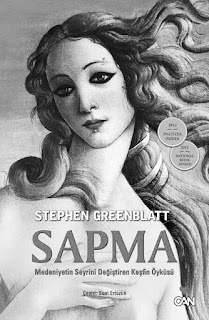I love Botticelli's Venus - so much that I even have a canvas copy in my room. While I was wandering around a bookstore, this book immediately captured my attention. It had Venus depicted in piercings and makeup in the cover and its name was «deviation» in Turkish. I bought it without even thinking.
This book is a study of how Lucretian doctrines emerged during the European Renaissance due to the contingent discovery; and subsequent circulation, by Poggio Bracciolini, of an ancient manuscript on atomic physics by the Roman poet Lucretius titled On the Nature of Things in the fifteenth century. This contingent discovery not only reshaped cognitive patterns during the early modern period, but also mediated the ideological conflicts between materialism and spiritualism during the Renaissance. The discovery of this book by Lucretius also became important for the Renaissance because it set out a theory of the swerve that depicts how atoms fall. Lucretius’ theory of the subject is modelled on the fall of these atoms which don’t just fall, but swerve in their trajectories when they do so. It is this swerve then - within the trajectory of the atom - that makes it possible to envisage the existence of free will since a deterministic model of the world cannot explain all physical and psychological phenomena given that the trajectory of the swerve is not mechanical but probabilistic. The relationship between theories of historical determination and theories of free will in the history of ideas therefore had to be thought through by invoking the notion of the Lucretian swerve.
Most of the book was about Poggio Bracciolini and how Lucretius' writing was discovered again. To be quite honest, I was more interested in Lucretius and his ideas rather than Poggio's life and other details that are not about the book. If you are interested in history it's a good fit for you but the part I enjoyed the most was the breakdown of Lucretius' ideas. Even in the old times there were people ahead of the norm that is still widely accepted today. I must say this made me feel very pleased.
Here are the main principles of Lucretius:
• Everything is made of invisible particles.
• The elementary particles of matter—“the seeds of the things”—are eternal.
• The elementary particles are infinite in number but limited in shape and size.
• All particles are in motion in an infinite void.
• The universe has no creator or designer.
• Everything comes into being as a result of a swerve.
• The swerve is the source of free will. In the lives of all sentient creatures, human and animal alike, the random swerve of elementary particles is responsible for the existence of free will.
• Nature ceaselessly experiments.
• The universe was not created for or about humans.
• Humans are not unique.
• Human society began not in a Golden Age of tranquility and plenty, but in a primitive battle for survival.
• The soul dies.
• There is no afterlife.
• Death is nothing to us.
• All organized religions are superstitious delusions.
• Religions are invariably cruel.
• There are no angels, demons, or ghosts.
And my favorites:
• The highest goal of human life is the enhancement of pleasure and the reduction of pain. Life should be organized to serve the pursuit of happiness. There is no ethical purpose higher than facilitating this pursuit for oneself and one’s fellow creatures. All the other claims—the service of the state, the glorification of the gods or the ruler, the arduous pursuit of virtue through self-sacrifice—are secondary, misguided, or fraudulent.
• The greatest obstacle to pleasure is not pain; it is delusion. The principal enemies of human happiness are inordinate desire—the fantasy of attaining something that exceeds what the finite mortal world allows—and gnawing fear.
• Understanding the nature of things generates deep wonder. The realization that the universe consists of atoms and void and nothing else, that the world was not made for us by a providential creator, that we are not the center of the universe, that our emotional lives are no more distinct than our physical lives from those of all other creatures, that our souls are as material and as mortal as our bodies—all these things are not the cause for despair. On the contrary, grasping the way things really are is the crucial step toward the possibility of happiness. Human insignificance—the fact that it is not all about us and our fate—is, Lucretius insisted, the good news.


Comments
Post a Comment